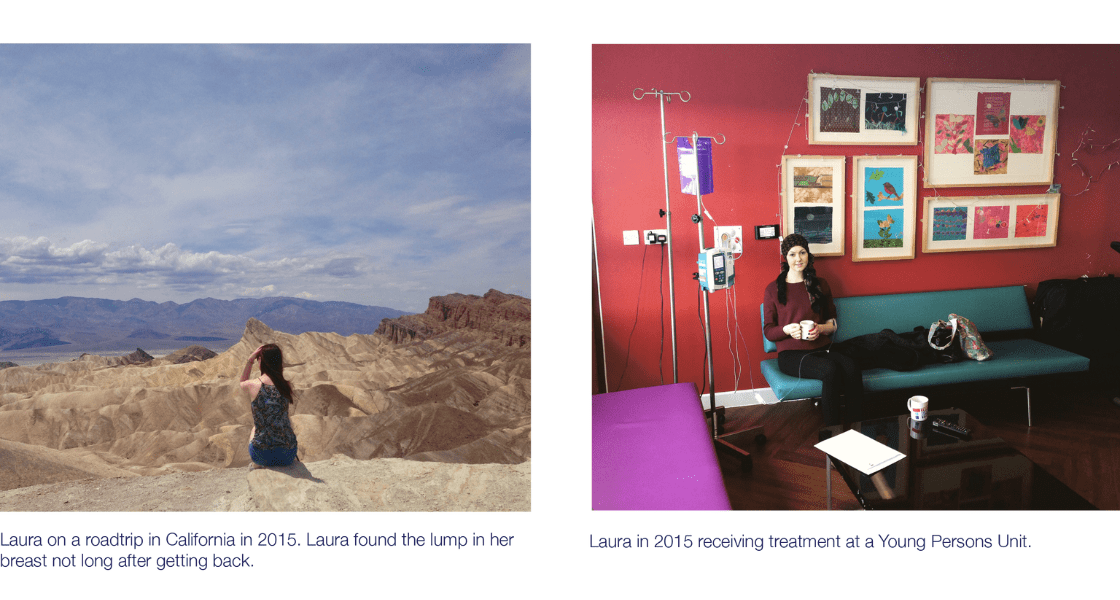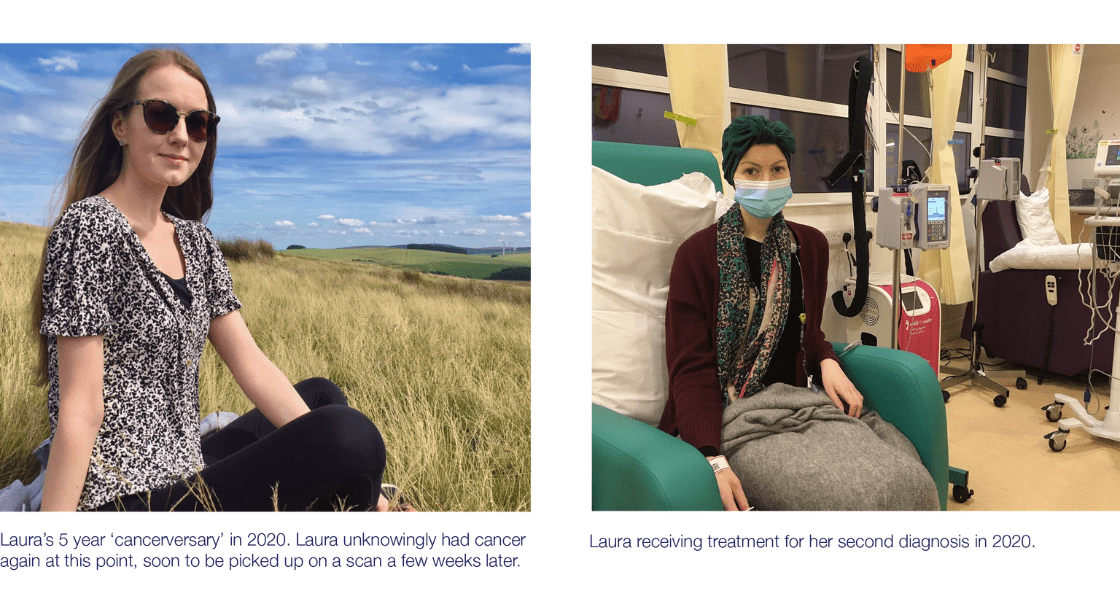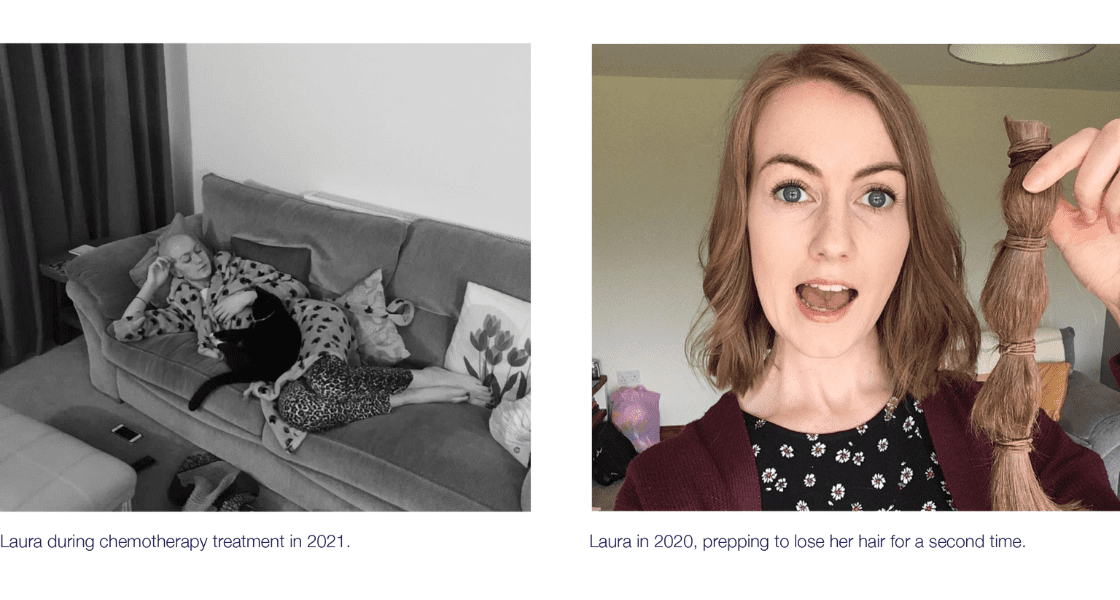
Laura was 24 when she found something unusual during one of her regular chest checks. After being diagnosed with breast cancer, Laura was diagnosed for a second time five years later, just before Covid-19 took hold. Laura spoke to us about her experience and what her advice would be to her 24-year old self.
When did you notice something unusual for you?
I was 24 when I discovered a lump as part of a regular boob check whilst laying down in bed. The lump felt fixated and like a hard marble shape, which I instantly knew was alarming for me. I spoke to my mum and sister about the lump and asked both of them to have a feel of it.
What did you do once you’d found the lump?
My mum agreed that the lump was concerning and so she booked me in for an urgent GP appointment. I was seen a few days later and thankfully my GP took me seriously. He was also able to detect the lump and so referred me to the breast screening service, although he did say that he wasn’t concerned. Around ten days later, I was seen by a breast surgeon at a one-stop clinic who examined me and then sent me for an ultrasound scan. After the scan they wanted to take a few biopsies – the team kept referring to the lump as a “query fibroadenoma” [a suspected non-cancerous lump] which lulled me into a bit of a false sense of security, but I had a gut feeling it was cancer.
My breast surgeon at the time wasn’t overly concerned and said I could wait a few weeks for further tests, but I wanted to wrap things up quickly for peace of mind – good job too. I was told I would receive my results in writing but I got a phone call asking me to come in to discuss them. I instantly knew it wasn’t going to be good news. My gut feeling was right and my breast cancer nurse broke the news to me that I had cancer. I felt numb and cried. My mum was with me and we both collapsed into each other’s arms. I so vividly remember my mum saying she wished it was her. I certainly didn’t – I was relieved it was me and not her.
After the appointment, we both felt slightly delusional driving home. One moment we were laughing, the next we were crying. We couldn’t quite process it. We drove to break the news to my sister and called my dad to let him know (who was in a conference meeting at the time!) Then we headed home to tell my step-dad. The hardest part for me was telling my family and knowing that their hearts would be breaking.

Did you know much about breast cancer before you were diagnosed?
We have a significant cancer history within our family: we lost my uncle in his 30s to a brain tumour, and my mum was diagnosed with malignant melanoma [a type of skin cancer] in her early 40s. Every generation has been affected by cancer of some type, however we’ve had no breast cancer history other than myself. I was aware that breast cancer could affect young adults, but only really started checking my breasts properly from the age of 18-ish. My mum always encouraged us to be aware of our bodies, but what really prompted me to be more vigilant with checks was when my sister had a fibroadenoma removed which revealed a benign Phyllodes tumour [a type of tumour that is usually non-cancerous] hiding underneath. It just so happened that a year on from that, I found the lump in my own breast.
Could you tell us a bit about your second diagnosis?
Five years after my diagnosis, when I was 29, I attended a routine annual MRI scan. I had swapped over to six-monthly scans for a while due to an inflammation being reported in my left breast. This was proving to be quite stressful so I was in discussions with my breast surgeon about having a preventative mastectomy. Covid-19 came along and unfortunately stopped all that, but thankfully I was called for my routine MRI (unusually early, actually). I was told that my MRI was fine, however shortly after I had a routine mammogram and the next day I got a call from my breast cancer nurse to say that an area of concern had been detected. My MRI was in fact not fine all along. I found myself back in the hospital a few days later for a scan, multiple biopsies and a mammogram. I knew it was cancer again – my mum did too. We sat outside on a bench before my follow up appointment whilst we waited to be called in. I couldn’t stop shaking, adrenaline was taking hold of my body. We were escorted to the ‘comfortable’ room (a.k.a. The ‘Breaking bad news room’) I felt more prepared this time and didn’t even cry when they told me it was a new primary cancer. I just felt completely and utterly gutted. I was completely asymptomatic and felt fortunate I was having the routine scans as it could have been detected later.

How have your diagnoses impacted your life?
Cancer certainly has had a huge impact on my life. It has massively affected my career and I haven’t been able to pursue the pathway I had hoped for. I hold onto hope that I will be able to get back on track in the future, all being well. There is no denying it has affected my relationships – in some ways, it has bought my partner and I closer together, but it has also tested us in several ways. Some friendships have fizzled out throughout my treatment – I don’t blame anybody for that, but cancer has certainly shown me who my real friends are and I feel grateful for that. I feel fortunate to have had such massive support from people across social media and since establishing a place within the cancer community online, I feel a lot more whole and less alone.

How are you coping with treatment?
I am still grappling with the side effects of my treatment and I feel it may take me a bit longer to recover this time, since I have developed Chronic Fatigue Syndrome on the back burner of my previous diagnosis. I’m taking each day as it comes. As cliche as that sounds, it’s the best way forward. There isn’t a lot about my experience that can be changed that’s within my control, but if I could go back to Laura in 2015 (when I was first diagnosed), I would tell her that it’s going to be beyond difficult at times, but there will always be glimmers of hope within that and to keep holding onto the better moments.
My advice for anyone is to know what is normal for you. It’s so important to get to know your body so you can identify any changes and seek any medical advice if you have any problems or concerns.
For anyone having to go through diagnosis and treatment, try not to look too far ahead. Try to focus on the ‘now’ and be in the moment as much as you can be. The bigger picture can sometimes be overwhelming, so take one step at a time.